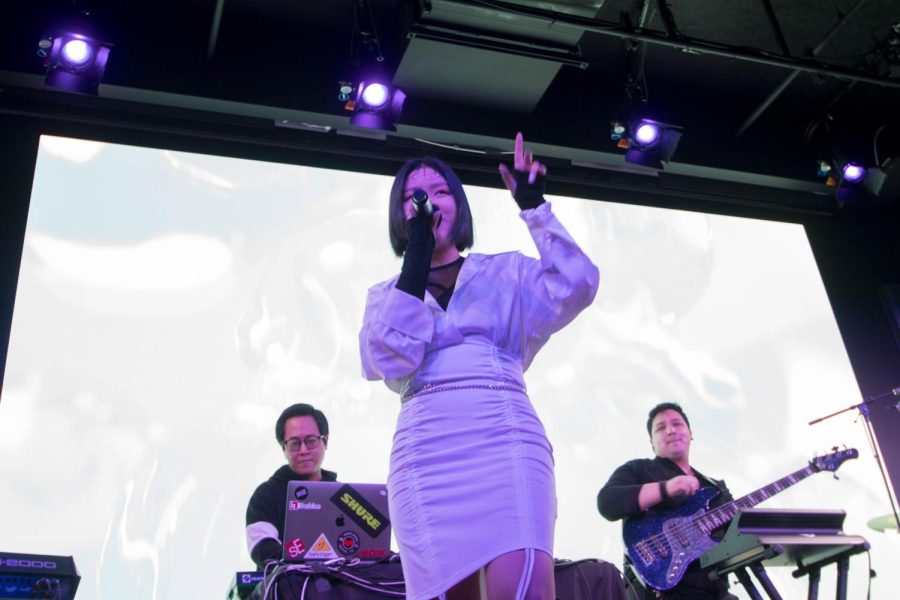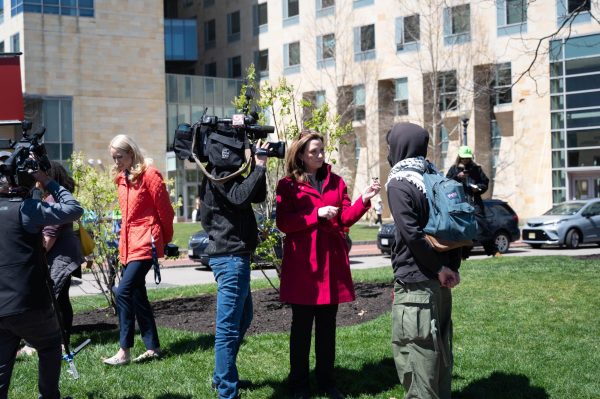Berklee alum HEESU shines with NPR Tiny Desk win
HEESU’s win in the NPR Tiny Desk Contest is bringing attention to her single “Me.” She connects to her Korean culture through the lyrics and instruments of the song. Photo credit to Luiza Ghirardelli
February 25, 2022
For Heesu Yu, her musical style doesn’t fall into any one category.
The South Korean artist, who branded herself as HEESU last year, is a 2021 graduate of the Berklee College of Music, where she was exposed to and inspired by a variety of genres, including neo-soul, jazz, R&B, house, electronic and sometimes fusions of multiple genres at once. The inability to limit her musical style into just one of these categories is clear in the songs Yu writes and produces today, including “Me”, HEESU’s winning submission for the 2021 NPR Tiny Desk Contest.
Struggling to assign a singular genre to “Me,” Yu described the cocktail of musical styles in the song’s melody.
“My band, what they’re playing [in “Me”] is very jazz-fusion with a hint of R&B, pop and neo-soul,” Yu said.
Evident by the title, “Me” is centered wholly around the self: self-discovery, self-focus, self-love. Much like the cozy, musical space that Tiny Desk is meant to encapsulate, “Me” demonstrates that there is not much room for anything else other than the needs and desires of the individual. The lyrics are a testament to that idea: “I gotta put myself first/ No more time to lose.”
“I wrote the song after I broke up with my ex, and it’s a song about moving on from past relationships,” Yu said.“I realized nothing’s as important as putting myself first and taking care of me.”
But listeners don’t need to be recently single to resonate with the song. Yu reveals that part of the song’s premise is about rediscovering the self during the pandemic, an undertaking most can undoubtedly relate to.
“I really wanted to sing something that’s positive because it was during the pandemic,” Yu said. “In my lyrics it says ‘2020 was a time for myself’ because it was really a time to take care of myself and focus on myself and my career and my music.”
For the artist herself, “Me” is a personal gemstone because its hook is sung in her native Korean language.
“‘Me’ is my first song that I’ve ever written [where] the hook is in Korean, so it’s very special to me,” Yu said.“It really represents me as a person [and] as a Korean artist.”
However, the hook’s Korean lyrics don’t deter listeners who can’t understand the words from enjoying the melody.
“That hook can still get stuck in your head even if you don’t speak Korean,” one of the contest’s panelists Amelia Mason wrote, demonstrating how the essence of the song’s melody allows language to transcend linguistic borders.
Lorenzo Bellini, Yu’s keyboardist for “Me,” and a 2021 graduate of Berklee who majored in piano performance, also attests to the accessibility of the song.
“Music is a language that has always crossed the border much easier than the verbal language,” he said.
Despite the delicate balance between identities that cross-cultural artists must manage, Yu is careful not to favor one national audience over the other.
“It’s not like the Korean audience is more important than the American audience or vice versa,” Yu said. “I just wanted to make a song for everyone.”
This isn’t Yu’s first time integrating Korean elements into her music. While learning the colonial history of R&B at Berklee, Yu said she was inspired to reconnect with the cultural roots of Korean music, an endeavor especially important to her as the daughter of a composer and conductor of traditional Korean music.
In order to properly translate facets of traditional music into her contemporary work, Yu began self-producing. The result was “Honey Eyes,” the first single she produced herself. The song includes a sample of the gayageum, a traditional Korean string instrument. Producing her own work has allowed Yu to maintain artistic autonomy and embrace her perfectionist tendencies.
“I just want to create something that sounds like HEESU,” Yu said.
Akin to the “infectious energy” of her Tiny Desk Contest performance, Yu was something of a contagious force herself at Berklee, spreading her positivity and fearless ambition to those around her.
For Stephanie Pourgouri, Yu’s close friend and a senior double major in contemporary writing and production and music performance at Berklee, Yu kick-started Pourgouri’s performing career by encouraging her to conduct and perform her first show at the musical college.
“[HEESU] was the one that pushed me to have my first show at such an early stage at Berklee and from then on I’ve been so inspired to continue performing because I just loved my first show that she made me do … I feel like I’ve grown a lot as a performer,” Pourgouri said.
When asked what has been most integral to their formation as musicians today, Yu, Bellini and Pourgouri all emphasized the cultural diversity of their college. Originally trained as a classical musician in Italy, Bellini said that without the international presence of the student body, he would not have been introduced to HEESU’s music style that challenges traditional labeling-conventions yet incorporates her Korean roots.
“[Labels] are a way of formalization to categorize things but some things can grow in the middle between two styles and you don’t know what to really call them,” Bellini said. “[HEESU’s] singing is really soul but the melody traces back to her Korean origins.”
It’s hard to stay motivated as a budding musician, especially when you may not have anything to show for it yet. Yu said that it was discouraging not to have original tracks in the first half of her Berklee college years, while being surrounded in a sea of other talented and experienced musicians.
However, it was a mere three lines from “After the Storm” by Kali Uchis that served as a wake-up call for the South Korean “Me” singer: “Just look in the mirror/ No one’s gonna save you now/ So you better save yourself.”
While it may feel cliché, Yu’s advice to other young artists is to follow that philosophy, even if it means challenging the odds stacked against you.
“If you don’t believe in yourself, who’s going to believe in you?” Yu said.


















